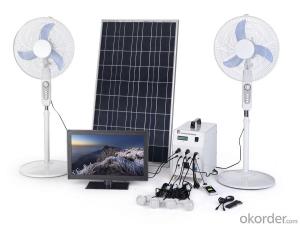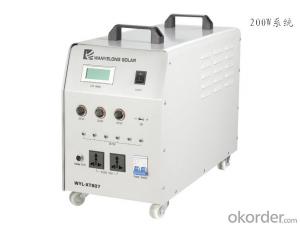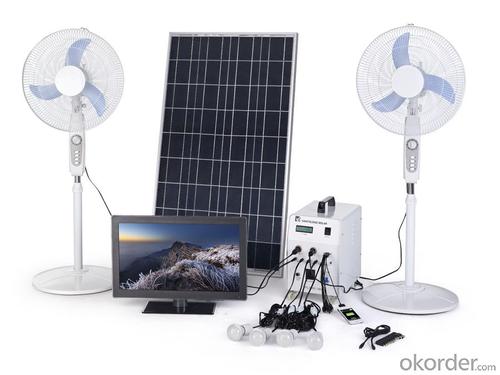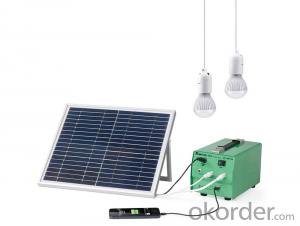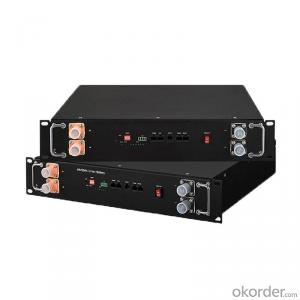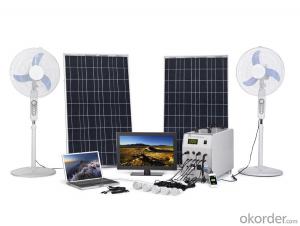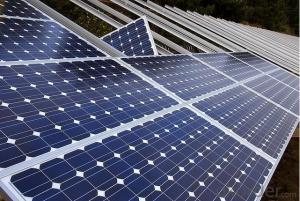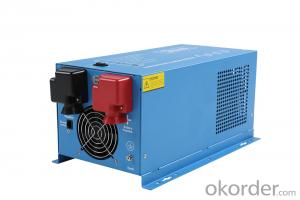200W Solar Power System Integrated Power Supply Box
- Loading Port:
- Guangzhou
- Payment Terms:
- TT OR LC
- Min Order Qty:
- 20 set
- Supply Capability:
- 10000 set/month
OKorder Service Pledge
OKorder Financial Service
You Might Also Like
Specification
1. Solar panel : crystalline silicon 100W18V, efficiency>=16%;
2. Integrated power supply box : Built-in maintenance-free lead-acid battery: 55AH12V, PWM controller: 25A12V; Pure sine wave inverter: 300W12V; 1*USB output for charging cell phone. 2*cigarette lighter output for charging DC12V fan. 4*2.5W12V output for LED lamp;
3. LED lamp : 3W12V with 5m wires and switches, 4 set;
4. Charging and using time: battery full charged time 6hours. 2 fans and 4 LED lamps totally using time 10hours;
5. Warranty: Panel 10 years; Battery 1 year; others 2 year.
Solar panel | Poly crystalline 100W 18V | |
Battery | 55AH12V lead-acid battery | |
LED lamp | 3watt, >50000 hours | |
cable of led lamp | 5m | |
Weight | 40 kg/set | |
Output | DC 12V and DC 5V,AC 110V~240V | |
Working Time | 2 fans and 4 LED lamps totally | |
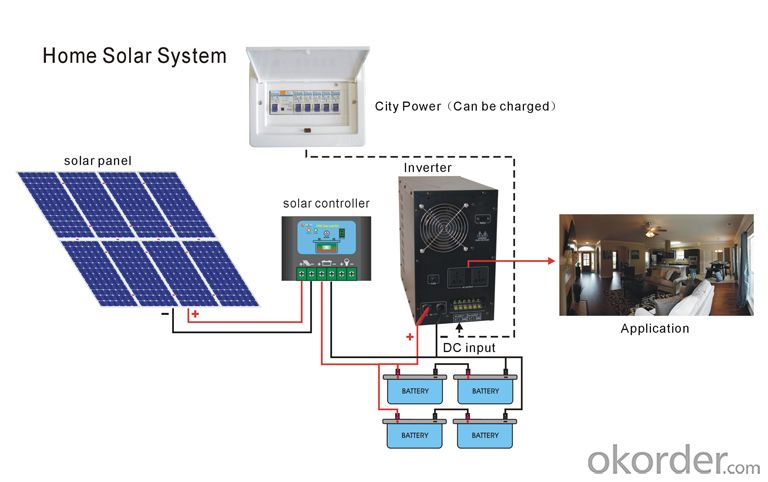
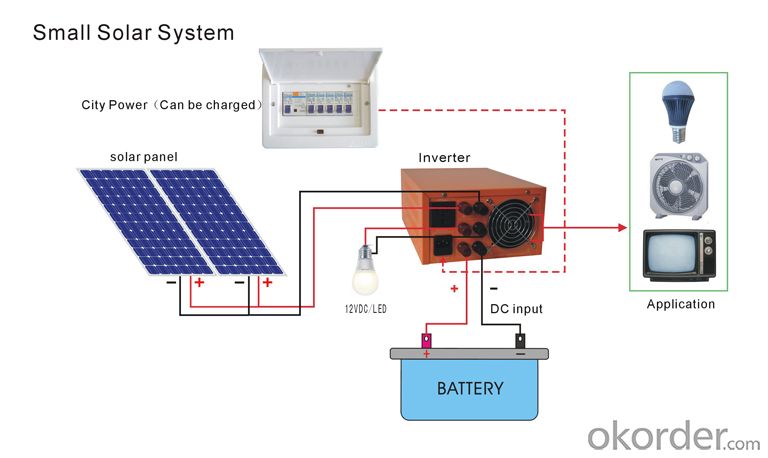
Quantuty
Quality goal:Constant innovation to meet the request of the customers. Protect the environment, provide environmental products to customer.
Quality strategy:
Quality: established high efficiency quality manager system in line with ISO9001 and ISO/TS16949.
Improvement: keeping improvement & quality guarantee.
Efficiency: delivery on time, complete the agreed events with the customers on time.
Service: focus on customers, provide the service and technology support on time.
FAQ
1. How long will my inquiry get response?
Your inquiry related to our products or prices will be replied within 24 hours.
2. Can I get professional service and suggestion?
Well-trained and experienced staffs to answer all your questions in fluent English.
3. Do you accept OEM or customized design?
OEM & ODM, any your customized lightings we can help you to design and put into product.
4. What if I need specific design?
Distributorship are offered for your unique design and some our current models.
- Q: Are there any disadvantages to using solar energy systems?
- Yes, there are a few disadvantages to using solar energy systems. Firstly, the initial installation cost can be high, making it less accessible for some individuals or communities. Secondly, solar panels require a significant amount of space to generate optimal power, making them less suitable for small or densely populated areas. Additionally, solar energy production is dependent on weather conditions, meaning its output may be variable and less reliable compared to traditional power sources. Lastly, the production and disposal of solar panels can have environmental impacts, especially if not properly managed. However, despite these disadvantages, the long-term benefits of solar energy, such as reduced greenhouse gas emissions and lower energy costs, often outweigh these drawbacks.
- Q: Can solar energy systems be used for powering electric vehicle solar charging stations at rest areas?
- Yes, solar energy systems can be used to power electric vehicle solar charging stations at rest areas. Solar panels can be installed at these locations to capture sunlight and convert it into electricity, which can then be used to charge electric vehicles. This renewable energy source not only provides a sustainable and environmentally friendly option for charging electric vehicles but also helps reduce reliance on the electrical grid.
- Q: How do solar energy systems contribute to reducing peak demand on the electrical grid?
- Solar energy systems contribute to reducing peak demand on the electrical grid in several ways. Firstly, during sunny days, these systems generate electricity from the sun, which can be directly used by homes and businesses, reducing their reliance on the grid. This decreases the overall demand on the grid during peak times. Additionally, excess solar energy generated during the day can be stored in batteries or fed back into the grid, providing a supplemental power source during peak demand periods. This helps to balance the load on the grid and reduces strain on conventional power plants, leading to a more stable and reliable electrical grid.
- Q: Can solar energy systems be used in cloudy or rainy climates?
- Yes, solar energy systems can still be used in cloudy or rainy climates. While solar panels generate more electricity under direct sunlight, they can still produce energy on cloudy days or during light rain. However, the energy output may be lower compared to sunny conditions. Additionally, advancements in technology have improved the efficiency of solar panels in capturing diffuse light, making them more suitable for regions with less sunlight.
- Q: Can solar energy systems be used in powering scientific research vessels or marine laboratories?
- Yes, solar energy systems can definitely be used to power scientific research vessels or marine laboratories. Solar energy is a renewable and sustainable source of power that can be harnessed using photovoltaic panels or solar thermal collectors. Research vessels and marine laboratories require a significant amount of energy to carry out their operations, which often includes scientific experiments, data collection, and analysis. These activities typically involve equipment such as computers, sensors, and lab instruments that require a constant and reliable source of power. Solar energy systems can be installed on these vessels or laboratories to provide a clean and efficient source of electricity. The photovoltaic panels convert sunlight into electricity, which can then be used to power the various equipment and systems onboard. Additionally, excess energy produced by the solar panels can be stored in batteries for use during periods of low sunlight or at night. Utilizing solar energy in these marine environments offers several advantages. First, it reduces the dependence on fossil fuels and minimizes the carbon footprint associated with traditional power generation methods. This is especially important in the context of scientific research, as it aligns with the principles of environmental sustainability and conservation. Second, solar energy systems provide a reliable and independent source of power. Research vessels and marine laboratories often operate in remote or isolated locations where access to traditional power grids may be limited or non-existent. By utilizing solar energy, these vessels and facilities can generate their own electricity and continue their research activities without relying on external power sources. Finally, solar energy systems are low-maintenance and have a long lifespan. Once installed, they require minimal upkeep and can withstand the harsh marine environment. This makes them well-suited for use in research vessels or marine laboratories, where downtime and maintenance issues can be disruptive to ongoing scientific projects. In conclusion, solar energy systems can certainly be used to power scientific research vessels or marine laboratories. They offer a sustainable, reliable, and independent source of electricity, reducing the carbon footprint and ensuring uninterrupted research activities even in remote locations.
- Q: Can solar energy systems be used in conjunction with energy storage systems?
- Yes, solar energy systems can be effectively used in conjunction with energy storage systems. Solar energy systems generate electricity during daylight hours, and any excess energy generated can be stored in energy storage systems such as batteries. These batteries can then be used to power homes or businesses during periods when solar energy generation is limited, such as at night or during cloudy weather. This combination of solar energy systems and energy storage systems allows for a more consistent and reliable supply of electricity, reducing dependence on the grid and promoting greater sustainability.
- Q: Can solar energy systems be used in areas with extreme temperature fluctuations?
- Yes, solar energy systems can be used in areas with extreme temperature fluctuations. Solar panels are designed to withstand a wide range of temperatures, from extremely high to extremely low. Additionally, advancements in technology have made solar panels more efficient in converting sunlight into electricity, even in harsh climatic conditions. However, it's important to note that extreme temperature fluctuations may affect the overall performance and efficiency of solar panels, so proper maintenance and monitoring are necessary to ensure optimal performance.
- Q: What is net metering?
- Net metering is a billing arrangement that allows solar panel owners to receive credit for the excess electricity they generate and feed back into the grid. This means that when their solar panels produce more electricity than they need, the surplus is sent to the grid, effectively spinning their energy meter backwards and reducing their future electricity bills.
- Q: What is the lifespan of solar panels used in solar energy systems?
- The lifespan of solar panels used in solar energy systems typically ranges from 25 to 30 years.
- Q: Can a solar energy system be installed on a parking garage or structure?
- Yes, a solar energy system can be installed on a parking garage or structure. In fact, parking garages and structures are often ideal locations for solar panel installations due to their large, open areas and unobstructed access to sunlight. Installing solar panels on parking structures not only helps to generate clean and renewable energy, but it can also provide shading for parked vehicles, reducing the heat island effect and improving energy efficiency.
Send your message to us
200W Solar Power System Integrated Power Supply Box
- Loading Port:
- Guangzhou
- Payment Terms:
- TT OR LC
- Min Order Qty:
- 20 set
- Supply Capability:
- 10000 set/month
OKorder Service Pledge
OKorder Financial Service
Similar products
Hot products
Hot Searches
Related keywords
